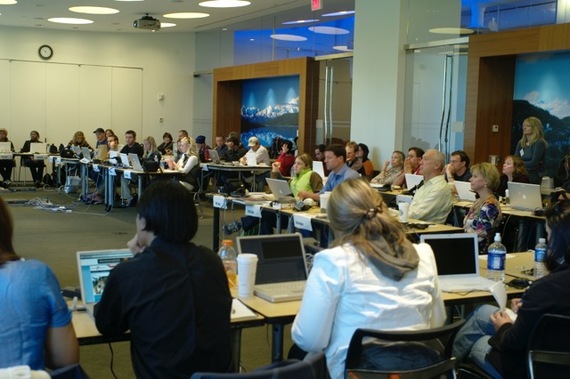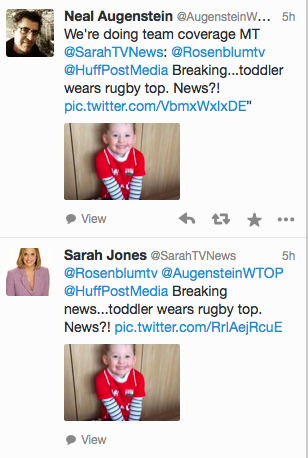Creating yet another room full of Travel Journalists
Yesterday, I wrote a blog here entitled 'Today We Are All Journalists".
And, of course, I put the links on Twitter.
(I have to do what I have to do to get my opinions out to the public).
Normally, when I publish something, it disappears into the great black hole of the blogosphere, never to be heard from again.
But this time, it was different.
Having put the link to the Today We Are All Journalists piece out there, I got more than 17,000 Re-Tweets on Twitter.
No, that's a lie. I made that up. (What am I, Brian Williams, 'professional' journalist?)
I didn't get anywhere near that.
But I did kick off a very interesting discussion.
Here are a few of the responses:
If everyone is a journalist, then whatever they publish is 'news'? Right?
And who gets to define what 'news' is?
The professional journalists were a bit annoyed. Weren't they the pros? Weren't they the ones who are getting paid to 'make the news' or at least to report it? How can it be that anyone can now join in the fun? What happens to their careers, their jobs, their sense of self-identity?
It's fine to report that Blockbuster has gone out business because of Netflix or that Amazon is killing the local bookstore. But what happens when the power of the digital revolution and the web hit closer to home?
AJ Leibling wrote, "Freedom of the press belongs only to those who own one."
In those days, owning a press or a newspaper was expensive. And not nearly as expensive as owning a TV station! So the press, and thus the power to define what was 'news' was really in the hands of the very few - the rich very few. The very rich very few - and of course, those who worked for them.
The Internet Revolution has changed all of that.
Now it is possible for ANYONE to 'own' a press.
That is what I am doing here in my living room. I am publishing on Word Press. It is called that for a reason. And anyone with an iPhone can create video news and put it out to more than 3 billion people whenever they want, for free. (That's a lot more homes than even Comcast gets into).
So the same technology that obviated classified ads and VHS rental stores is now about to obviate conventional journalism. And that is no bad thing.
But what about 'what is news?'
If everyone can make and publish 'news', (which clearly they can), then what defines what is news?
Now, for the first time, the news business is faced with the ramifications of a truly free and democratic press.
This has happened before, but in other 'professions'.
Anyone with a paintbrush may apply paint to canvas and declare themselves an artist.
It is in the eye of the beholder.
But they are most definitely artists.
Anyone with a guitar can create music.
That too, is for the listener to decide.
Now journalism and news enter this realm.
It is a bit scary for the old school practitioners. They were used to the Soviet World of News. WE define it, you watch it.
Our 2024 Coverage Needs You
It's Another Trump-Biden Showdown — And We Need Your Help
The Future Of Democracy Is At Stake
Our 2024 Coverage Needs You
Your Loyalty Means The World To Us
As Americans head to the polls in 2024, the very future of our country is at stake. At HuffPost, we believe that a free press is critical to creating well-informed voters. That's why our journalism is free for everyone, even though other newsrooms retreat behind expensive paywalls.
Our journalists will continue to cover the twists and turns during this historic presidential election. With your help, we'll bring you hard-hitting investigations, well-researched analysis and timely takes you can't find elsewhere. Reporting in this current political climate is a responsibility we do not take lightly, and we thank you for your support.
Contribute as little as $2 to keep our news free for all.
Can't afford to donate? Support HuffPost by creating a free account and log in while you read.
The 2024 election is heating up, and women's rights, health care, voting rights, and the very future of democracy are all at stake. Donald Trump will face Joe Biden in the most consequential vote of our time. And HuffPost will be there, covering every twist and turn. America's future hangs in the balance. Would you consider contributing to support our journalism and keep it free for all during this critical season?
HuffPost believes news should be accessible to everyone, regardless of their ability to pay for it. We rely on readers like you to help fund our work. Any contribution you can make — even as little as $2 — goes directly toward supporting the impactful journalism that we will continue to produce this year. Thank you for being part of our story.
Can't afford to donate? Support HuffPost by creating a free account and log in while you read.
It's official: Donald Trump will face Joe Biden this fall in the presidential election. As we face the most consequential presidential election of our time, HuffPost is committed to bringing you up-to-date, accurate news about the 2024 race. While other outlets have retreated behind paywalls, you can trust our news will stay free.
But we can't do it without your help. Reader funding is one of the key ways we support our newsroom. Would you consider making a donation to help fund our news during this critical time? Your contributions are vital to supporting a free press.
Contribute as little as $2 to keep our journalism free and accessible to all.
Can't afford to donate? Support HuffPost by creating a free account and log in while you read.
As Americans head to the polls in 2024, the very future of our country is at stake. At HuffPost, we believe that a free press is critical to creating well-informed voters. That's why our journalism is free for everyone, even though other newsrooms retreat behind expensive paywalls.
Our journalists will continue to cover the twists and turns during this historic presidential election. With your help, we'll bring you hard-hitting investigations, well-researched analysis and timely takes you can't find elsewhere. Reporting in this current political climate is a responsibility we do not take lightly, and we thank you for your support.
Contribute as little as $2 to keep our news free for all.
Can't afford to donate? Support HuffPost by creating a free account and log in while you read.
Dear HuffPost Reader
Thank you for your past contribution to HuffPost. We are sincerely grateful for readers like you who help us ensure that we can keep our journalism free for everyone.
The stakes are high this year, and our 2024 coverage could use continued support. Would you consider becoming a regular HuffPost contributor?
Dear HuffPost Reader
Thank you for your past contribution to HuffPost. We are sincerely grateful for readers like you who help us ensure that we can keep our journalism free for everyone.
The stakes are high this year, and our 2024 coverage could use continued support. If circumstances have changed since you last contributed, we hope you'll consider contributing to HuffPost once more.
Already contributed? Log in to hide these messages.


